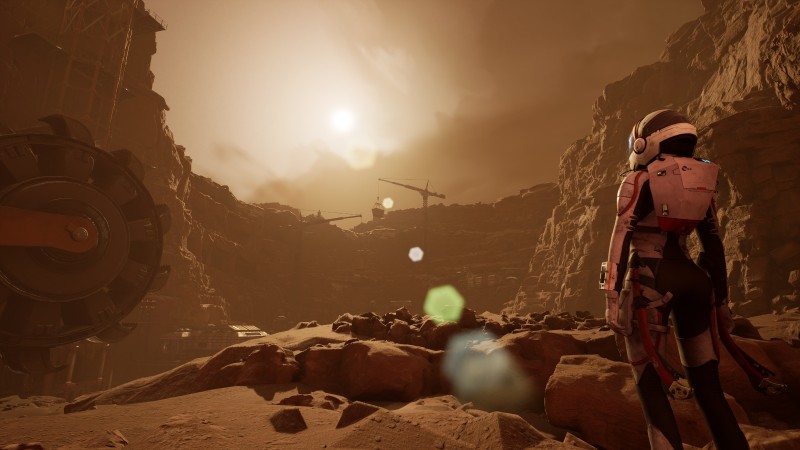
Reviewed on: PlayStation 5 Platform: PlayStation 5, Xbox Series X/S, PlayStation 4, Xbox One, PC Publisher: Frontier Foundry Developer: KeokeN Interactive Release: February 2, 2023 Deliver Us Mars follows in the footsteps of hidden gem Deliver Us The Moon, a game with enjoyable puzzle-solving and storytelling that mostly overcame its technical and presentational shortcomings. The same is nearly true of this sequel set on the Red Planet, though its larger scope magnifies its problems. Thankfully, a captivating narrative does its best to keep this flawed mission on track. Despite being a direct sequel, you don’t need to play Deliver Us The Moon to grasp Mars’ plot. Earth has spiraled into an irreversible environmental collapse thanks to decades of man-made abuse. Soon it will become an uninhabitable rock, but hope arises when a transmission from Mars pinpoints the location of advanced life-giving ships called Arks. Years prior, a group of humanity’s best and brightest stole these vessels to abandon Earth to its fate and establish a new colony elsewhere. As Kathy, a bold and prodigious young astronaut, you join a small team tasked with bringing the Arks back to Earth, but Kathy has a compelling personal stake as well. Kathy’s father, Issac, a brilliant scientist, was among the leaders of this rogue group that stole Earth’s best chance at recovery. In the process, he left Kathy to grow up on a dying Earth without him. The game’s well-executed exploration of the pair’s loving-yet-complex relationship hooked me, especially how Kathy copes with wanting to reunite with the man who effectively helped doom humankind – a goal that causes a tense conflict with her crewmates. The engaging mystery regarding the fate of the Mars colony once Kathy arrives also kept me glued to see what’s next, thanks to its compelling twists and revelations. The plot also presents well-worn but compelling arguments regarding the morality of starting anew elsewhere in the face of humanity’s self-destructive nature. Deliver Us Mars’ narrative is so good that its sub-par presentation doesn’t do it justice. The ugly, stilted character models sour the exceptional performances; it’s like watching lousy animatronics perform Macbeth. Mars itself would be a more awe-inspiring sight if not for numerous instances of texture and environmental pop-in. Deliver Us Mars doesn’t look awful, but these constant blemishes distract from the immersion. Gameplay primarily focuses on puzzle-solving and platforming, which only cross into “acceptable” territory. As in the first game, players switch between controlling Kathy and her robotic drone companion to solve environmental tasks, often revolving around aligning power-giving light beams to open doors. The drone can access small openings and carry objects, though it doesn’t feel as well-utilized as in Deliver Us The Moon. The puzzles offer decently fun obstacles. However, Deliver Us Mars lacks the gameplay variety of its predecessor, so beam alignment lost its luster by the end. Outside of that, a sometimes disorienting though enjoyable hologram decryption minigame, where you rotate the drone’s camera to place nodes into slots, serves as the only other big recurring puzzle. Platforming plays a more significant role now that Kathy can scale particular walls using climbing axes. This mechanic leans on the realism side, with players using the left and right triggers to aim and strike with each arm. Like other mechanics, this action is just good enough to work, but climbing becomes tiresome in longer segments and unresponsive in some instances. Jumping from one climbing patch to another feels especially rough, and I fell to my death several times when my strikes didn’t register. The game sporadically throws in some hazards, such as spinning blades or collapsing wall panels, but the climbing isn’t tuned enough to handle them confidently. Deliver Us Mars’ protagonists quickly cobble together a space shuttle that barely manages to get them to their destination. A similar story feels true of this game. A gripping narrative fuels gameplay that otherwise feels functional but underbaked, making my time on the planet a mixed bag. Deliver Us Mars shines best when it lets you absorb its story, but expect to stumble over several design craters along the way. Score: 6.75 About Game Informer's review system Purchase
Reviewed on:
PlayStation 5
Platform:
PlayStation 5, Xbox Series X/S, PlayStation 4, Xbox One, PC
Publisher:
Frontier Foundry
Developer:
KeokeN Interactive
Release:
February 2, 2023
Deliver Us Mars follows in the footsteps of hidden gem Deliver Us The Moon, a game with enjoyable puzzle-solving and storytelling that mostly overcame its technical and presentational shortcomings. The same is nearly true of this sequel set on the Red Planet, though its larger scope magnifies its problems. Thankfully, a captivating narrative does its best to keep this flawed mission on track.
Despite being a direct sequel, you don’t need to play Deliver Us The Moon to grasp Mars’ plot. Earth has spiraled into an irreversible environmental collapse thanks to decades of man-made abuse. Soon it will become an uninhabitable rock, but hope arises when a transmission from Mars pinpoints the location of advanced life-giving ships called Arks. Years prior, a group of humanity’s best and brightest stole these vessels to abandon Earth to its fate and establish a new colony elsewhere. As Kathy, a bold and prodigious young astronaut, you join a small team tasked with bringing the Arks back to Earth, but Kathy has a compelling personal stake as well.
Kathy’s father, Issac, a brilliant scientist, was among the leaders of this rogue group that stole Earth’s best chance at recovery. In the process, he left Kathy to grow up on a dying Earth without him. The game’s well-executed exploration of the pair’s loving-yet-complex relationship hooked me, especially how Kathy copes with wanting to reunite with the man who effectively helped doom humankind – a goal that causes a tense conflict with her crewmates. The engaging mystery regarding the fate of the Mars colony once Kathy arrives also kept me glued to see what’s next, thanks to its compelling twists and revelations. The plot also presents well-worn but compelling arguments regarding the morality of starting anew elsewhere in the face of humanity’s self-destructive nature.
Deliver Us Mars’ narrative is so good that its sub-par presentation doesn’t do it justice. The ugly, stilted character models sour the exceptional performances; it’s like watching lousy animatronics perform Macbeth. Mars itself would be a more awe-inspiring sight if not for numerous instances of texture and environmental pop-in. Deliver Us Mars doesn’t look awful, but these constant blemishes distract from the immersion.
Gameplay primarily focuses on puzzle-solving and platforming, which only cross into “acceptable” territory. As in the first game, players switch between controlling Kathy and her robotic drone companion to solve environmental tasks, often revolving around aligning power-giving light beams to open doors. The drone can access small openings and carry objects, though it doesn’t feel as well-utilized as in Deliver Us The Moon. The puzzles offer decently fun obstacles. However, Deliver Us Mars lacks the gameplay variety of its predecessor, so beam alignment lost its luster by the end. Outside of that, a sometimes disorienting though enjoyable hologram decryption minigame, where you rotate the drone’s camera to place nodes into slots, serves as the only other big recurring puzzle.
Platforming plays a more significant role now that Kathy can scale particular walls using climbing axes. This mechanic leans on the realism side, with players using the left and right triggers to aim and strike with each arm. Like other mechanics, this action is just good enough to work, but climbing becomes tiresome in longer segments and unresponsive in some instances. Jumping from one climbing patch to another feels especially rough, and I fell to my death several times when my strikes didn’t register. The game sporadically throws in some hazards, such as spinning blades or collapsing wall panels, but the climbing isn’t tuned enough to handle them confidently.
Deliver Us Mars’ protagonists quickly cobble together a space shuttle that barely manages to get them to their destination. A similar story feels true of this game. A gripping narrative fuels gameplay that otherwise feels functional but underbaked, making my time on the planet a mixed bag. Deliver Us Mars shines best when it lets you absorb its story, but expect to stumble over several design craters along the way.
Score:
6.75
About Game Informer’s review system



